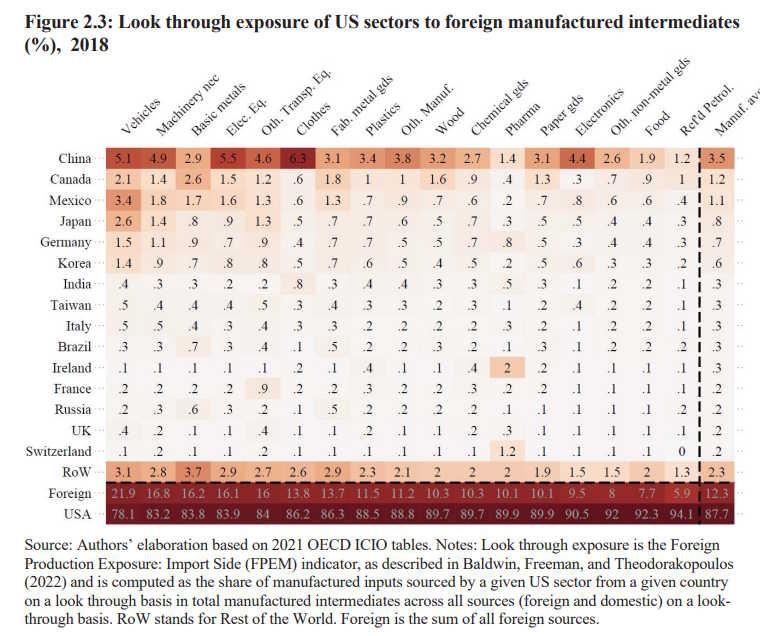
What A Real Anti-China Trade Strategy Would Look Like
I still think it's unlikely that this is intentional; there's an old adage that you should“never attribute to malice that which is adequately explained by stupidity.” The haphazard, last-minute, on-again-off-again way that Trump and his team have rolled out their tariff policy and the fact that Congress has not chosen to use its power to revoke the president's tariff authority suggest that stupidity is the main factor in play here.
But in any case, there are obviously some people within the Trump administration and the MAGA movement who would like Trump to produce a trade strategy that helps to contain Chinese power.
CEA Chair Stephen Miran has written that“China has chosen to double down on its mercantilist, export-led model to secure marginal income, much to the rest of the world's consternation.” And Treasury Secretary Scott Bessent went even further , suggesting that containment of China should be the main goal of US trade policy:
This is actually a very realistic goal. Every day that Trump's tariff chaos makes the US look like a chaotic clown car makes it a less realistic goal, but as of right now, I still think that it would be possible for the US to radically pivot its trade and industrial policies in order to create a coalition of nations that could economically balance, compete with and even isolate China. And it's not too hard to imagine what that strategy would look like.
But first, we should think about why we would want to economically pressure China and what we might hope to accomplish. After all, in an ideal world, countries simply trade with each other and get rich instead of fighting. And China has plenty of good stuff to offer the world - cool cars , cheap solar panels and batteries, and lots more. Why should we take an adversarial approach to trade with China?
The reason is geopolitics. Singing hymns to the gains from trade doesn't change the fact that, for whatever reason, the leaders of powerful countries sometimes want to dominate or even attack other nations. The world is an ungoverned place, and the balance of power is the only thing that keeps the peace.
Currently, China has become the world's preeminent manufacturing nation . Its current leaders also think of the US and many of its allies as either rivals or outright enemies. They appear determined to conquer Taiwan, carve off pieces of India, Japan, and the Philippines, and generally use Chinese power to dominate smaller countries. It makes sense to want to weaken China's ability to do all this, while strengthening the other nations' capacities to resist it.
The goals of trade policy with China should, therefore, probably include the following:
That doesn't mean that prosperity and cool cars shouldn't be goals of China trade policy, but merely that they should be augmented with these other geopolitical goals.
In any case, when I talk about economically“containing” China, that's what I'm talking about. So here's a list of things we would do if we were serious about that goal. Obviously, this list is very, very far away from anything the Trump administration is doing or contemplating. But this is what I think it would take.
Zero trade barriers with any nations other than ChinaManufacturers need scale to drive down costs and remain competitive. One reason China's manufacturers are so formidable - and why American manufacturers were so formidable relative to their rivals 80 years ago - is that they have access to a huge domestic market.
Chinese car companies like BYD can sell untold numbers of cars to their billion consumers; this allows those companies to scale up and drive down costs to levels no foreign competitor can match. BYD is currently building a single factory that's bigger than the city of San Francisco .
Another key factor that makes Chinese manufacturers so powerful is domestic supply chains. Practically everything that goes into a Chinese EV, particularly the battery, the metal, and the chips, is produced in-country. That makes it very quick and easy for Chinese manufacturers to source everything they need, instead of having to struggle to import it from overseas.
It's inherently very hard for American manufacturers can match those two advantages. The US is much smaller than China - our consumption is larger in dollar terms, but we have far fewer people, and so our companies can't ship as many units domestically. Chinese people buy about double the number of cars every year that Americans do.

Legal Disclaimer:
MENAFN provides the
information “as is” without warranty of any kind. We do not accept
any responsibility or liability for the accuracy, content, images,
videos, licenses, completeness, legality, or reliability of the information
contained in this article. If you have any complaints or copyright
issues related to this article, kindly contact the provider above.



























Comments
No comment